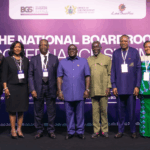
The second edition of the National Boardroom Governance Summit concluded with a call for African board leaders to embrace bold, ethical, and inclusive governance to sustain institutional growth and public trust.
Convened by Professor Douglas Boateng, the summit, held on October 14, 2025, at the Labadi Beach Hotel, brought together over 800 participants, including board chairpersons, CEOs, policymakers, regulators, and governance experts.
It was under the theme “Daring to be Different: The Role of the Chairperson in Effective Boardroom Governance.”
Delivering the keynote address, Hon. Julius Debrah, Chief of Staff at the Office of the President, highlighted that effective boardroom governance is vital to translating national strategies into tangible results.
He stressed that when leadership upholds integrity, accountability, and professionalism, it builds investor trust, drives job creation, and reinforces Ghana’s overall economic stability and growth.
“Sound boardroom governance determines whether strategy becomes success or another shelved ambition. When boards are transparent, accountable, and professionally run, capital becomes confident, jobs multiply, and institutions grow resilient.
“Weak governance, however, invites inefficiency, politicisation, and public mistrust. Ghana’s economic resilience, investor confidence, and national reputation are all reflections of how its boardrooms function,” the Chief of Staff stated.
He further emphasised that government, recognising this principle, remains committed to strengthening accountability and transparency through initiatives such as the Reset Agenda and the Government Accountability Series, which ensure that sector ministers publicly report on policies and progress.
He emphasised that these efforts reflect government’s resolve to build trust and integrity in governance, noting that while policies provide structure, true accountability must be nurtured within the culture of leadership itself.
He concluded by urging Chairpersons to lead with courage, fairness, and unwavering ethics, noting that aligning productivity with purpose strengthens boardroom governance, drives sustainable economic growth, and fosters national stability.
In his welcome remarks, Professor Douglas Boateng, Africa’s first-ever Professor for Industrialisation and Supply Chain Governance, emphasised the need for board chairs to move beyond routine compliance and embrace leadership anchored in purpose, conscience, and service to the greater good.
He noted that effective governance is not merely about titles or procedures, but about fostering trust, fulfilling duty, and shaping a sustainable future for society.
“The seat of the chairperson is not a furniture, it is a promise made to the people we meet today and those we may never meet, especially the children who will inherit the output of our decisions,” he stated.
Other distinguished speakers, including Alex Apau Dadey, Executive Chairman, KGL Group, Stephane Abass Miezan, President of the Ghana National Chamber of Commerce and Industry (GNCC), and Chief Alhassan Andani, Executive Chairman of LVS Africa, reiterated that Accountability, effective communications and respect for the CEO’s operational independence remain essential for effective boardroom governance.
The event featured three engaging panel sessions, interactive Q&As, and a networking session that facilitated cross-sector collaboration and peer learning.
Participants commended the summit for offering actionable insights on improving corporate governance practices in both private and public institutions.
Closing the summit, Professor Boateng thanked all sponsors and partners for their continued support.
“This year’s summit reinforces that governance transformation must begin from the top. Chairpersons must dare to be different; to inspire, to innovate, and to hold themselves accountable to the people and institutions they serve,” he said.
The National Boardroom Governance Summit is an annual platform convened by Professor Douglas Boateng to advance the culture of ethical governance, leadership accountability, and sustainable business growth across Africa.
The summit fosters learning, dialogue, and peer exchange among current and aspiring board leaders.



